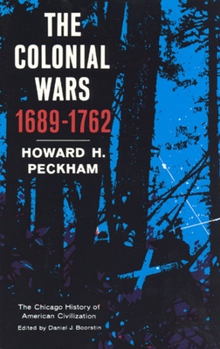Colonial Wars, 1689-1762
(Part of the The Chicago History of American Civilization Series)
Select Format
Select Condition 
Book Overview
A fascinating look at over seventy years of fighting in the American colonies--as France, England, and Spain tried to stake their claims in the New World. Although the colonial wars consisted of... This description may be from another edition of this product.
Format:Paperback
Language:English
ISBN:0226653145
ISBN13:9780226653143
Release Date:April 1965
Publisher:University of Chicago Press
Length:266 Pages
Weight:0.60 lbs.
Dimensions:0.6" x 5.2" x 7.9"
Customer Reviews
4 ratings
Excellent History Resource
Published by Thriftbooks.com User , 15 years ago
As a Colonial American history buff, this is a great resource for all of the wars preceding the American Revolution. This book contains excellent descriptions on wars that are not talked about much in school. King William's War, Queen Anne's War and other conflicts with French Canada are all detailed nicely. Moreover, this book gives great information on colonial skirmishes with frontier and northeastern Indian tribes. What I liked most about this book are the mini-biographies of great colonial military leaders like James Oglethorpe and William Pepperrell. This is a great resource about a little known part of American history. It shows the resiliance of American colonists and shows just how difficult the early settlement of our nation was.
A wonderful survey of the four colonial wars
Published by Thriftbooks.com User , 18 years ago
Peckham has done an exceptional job in bringing to life a time period that most people tend to ignore. It is these four wars combined that determined the outcome of the American Revolution just as much, if not more so, than the Revolution by itself. Peckham's short survey of 221 pages does well in capturing the North American continent and those that contended for it. His chapters progress seamlessly, allowing for a smoothly structured book. Additionally, his summaries at the end of each chapter don't feel detached from the ultimate telling, but rather breathes life into the wars and makes you want to read more. His Aftermath chapter is particularly poignant chapter, despite its length, as it shows a depth in understanding that will help anyone looking to understand the American and how they became who they are. The book does rely heavily on the actual battles, without delving too deeply into the specifics, which leads to a brief understanding to help further your understanding. At times I wished that he wrote more, but my appetite was satiated none the less. In a period that is much glossed over, Peckham has done a wonderful job in surveying the critical points of the four colonial wars. I would definitely recommend this book to anyone, especially if you are trying to focus on the Revolutionary War, as this will give you a better understanding of how the Americans became who they are.
Forgotton American History Is Reborn
Published by Thriftbooks.com User , 22 years ago
For a short work, this was interesting and exceptional reading. Mr.Peckham's accounts of the four Colonial Wars was accurate and complete. The struggle between France,England and Native Americans for control of North America is lost in schoolbooks and classrooms of today, because it was prior to the Revolutionary War. But the impact that these Colonial Wars had on the forming of our country is unmeasurable. Quality reading for those who want to turn the clock back a bit farther than the Boston Tea Party, and Bunker Hill.
A narrative of forgotten wars
Published by Thriftbooks.com User , 22 years ago
The North American colonial wars between Great Britain and France that flared repeatedly through the seventeenth and eighteenth centuries have long been hidden in the great shadow cast by the American Revolution. How many people today remember King William's War (1689-97), or Queen Anne's War (1702-13), or King George's War (1744-48), or the French and Indian War (1755-62)? But these conflicts should be better known, because in actual fact they determined the cultural fate of most of North America. Howard Peckham's volume, first published in 1964, is the best short survey of all of them.Beginning in the 1600s, Great Britain began to colonize the eastern seaboard of North America from Maine to Georgia. Even earlier, France had begun to occupy the valley of the St. Lawrence and to spread westward into the Great Lakes and then south to the Mississippi. From the late 1600s to the mid-1700s, conflicts in Europe between these two colonial powers (and between the Protestant and Catholic worlds they represented) spilled over into North America. Indian tribes played both sides off against each other, forming shifting alliances in an attempt to retain their own independence. Because of disputes over who should occupy the Spanish throne, for example, farmhouses were burned in the New England countryside, and Indian villages were destroyed in the woods of Maine. In the end, Great Britain and her colonies gained ascendancy, and France was forced to cede all of her Canadian possessions. The last of these imperial conflicts, the French and Indian War, set the political and military stage for the American Revolution which began only thirteen years after the French and Indian War had ended.Why should anyone remember these ancient battles? One simple reason is that they have left their mark all over the cultural landscape of eastern North America. They explain why there are lakes with names like "Champlain" along the borders of states like New "York"; why the eastern United States is dotted with towns named "Amherst" and "Pepperell" and "Shirley" (all generals in the colonial wars); and why so many people in French-speaking Quebec, more than 300 years after the colonial wars began, are still trying to secede from English-speaking Canada.





